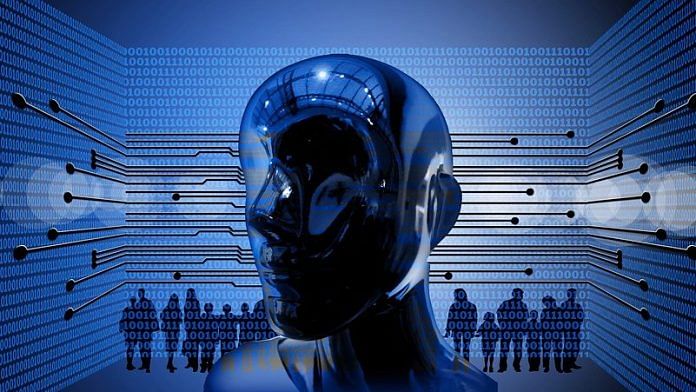
Thank you dear subscribers, we are overwhelmed with your response.
Your Turn is a unique section from ThePrint featuring points of view from its subscribers. If you are a subscriber, have a point of view, please send it to us. If not, do subscribe here: https://theprint.in/subscribe/
As the field of AI technology continues to develop and expand, we’re starting to see machines do things we never thought possible. From self-driving cars to chatbots that can pass the Turing test, it’s clear that we’re on the cusp of a technological revolution.
But as these machines become more advanced, there’s a growing concern that they may become too rational and objective, leading to a loss of empathy and intuition. After all, who wants to be treated like a machine when they’re seeking help from one?
To address this issue, companies like Affectiva and EmoShape are developing emotional AI technologies that can recognize and respond to human emotions. This is exciting because it means we could have machines that are capable of understanding and empathizing with our feelings.
However, there are still some major challenges to overcome, such as the risk of machines misinterpreting human emotions and making the wrong decisions. For example, what happens when a chatbot tries to offer condolences for a job promotion? Awkward!
In recent years, there have been several examples of AI mishaps that have captured global attention. For example, in 2016, Microsoft’s chatbot, Tay, was shut down after it began tweeting racist and sexist messages due to being trained on offensive content by malicious users. In 2018, Amazon’s AI hiring algorithm was found to be biased against female candidates, leading to a public outcry and calls for reform.
To avoid these types of mishaps, researchers and developers are working on developing more diverse and inclusive data sets, as well as using techniques such as explainable AI to ensure that humans can understand how decisions are being made and challenge them if necessary. This is important because we want to make sure that machines aren’t perpetuating biases or discrimination, like hiring algorithms that favor men over women.
As AI and automation continue to transform the global economy, there is growing concern that these technologies will perpetuate joblessness among the poor, exacerbating existing inequalities and creating a more divided society.
Recent studies have shown that the impact of AI on employment is likely to be felt most acutely among low-skilled workers. In the United States alone, it is estimated that 52% of jobs are at risk of automation by 2030, with the greatest impact expected to be felt in low-wage service jobs. In Europe, it is estimated that up to 30% of jobs are at risk of automation, with the greatest impact expected in industries such as manufacturing and transportation.
Moreover, research has shown that automation tends to disproportionately affect workers in developing countries, where many low-skilled workers are employed in industries that are vulnerable to automation. In India, for example, it is estimated that up to 69% of jobs are at risk of automation, with the greatest impact expected in industries such as textiles, food processing, and logistics.
To address this concern, policymakers and business leaders must take action to support workers who are at risk of losing their jobs due to automation. One potential solution is to invest in education and training programs that help low-skilled workers develop new skills and transition into new industries. According to a recent report by the World Economic Forum, upskilling and reskilling programs could help to create 95 million new jobs globally by 2030.
Another solution is to provide income support and other social protections to help those who are unable to find employment. Universal basic income programs, which provide a regular cash payment to all citizens regardless of employment status, have been proposed as a potential solution to address the potential job losses caused by automation. Pilot programs have been launched in countries such as Finland, Canada, and Kenya to test the feasibility of such programs.
Moreover, we must ensure that the benefits of AI and automation are shared more equitably. This means ensuring that the gains from these technologies are not concentrated in the hands of a few but are distributed more broadly throughout society. This may require policies that promote worker ownership and control of AI and automation, as well as policies that promote more equitable income distribution.
One potential solution to address this issue is to establish a global standards organization that can oversee the development and deployment of AI algorithms and automation technologies. This organization could set standards for AI development that prioritize transparency, accountability, and ethical considerations, ensuring that these technologies are developed and used in a manner that promotes the well-being of all members of society.
In conclusion, the potential impact of AI on employment is a concern that must be addressed if we are to avoid perpetuating existing cycles of poverty and inequality. By investing in education and training, providing income support and social protections, and promoting more equitable distribution of the benefits of AI and automation, we can help ensure that these technologies are developed and used in a manner that promotes the well-being of all members of society. A global standards organization could also help to ensure that these technologies are developed and used in a transparent and accountable manner, helping to mitigate the potential negative impacts of AI and automation on employment.
Only by doing so can we create a future that is more inclusive, equitable, and respectful of human rights and dignity.
These pieces are being published as they have been received – they have not been edited/fact-checked by ThePrint.
Also read: SubscriberWrites: Drugs and cosmetics Act needs reform. Pharmacists do not get their due in India

COMMENTS